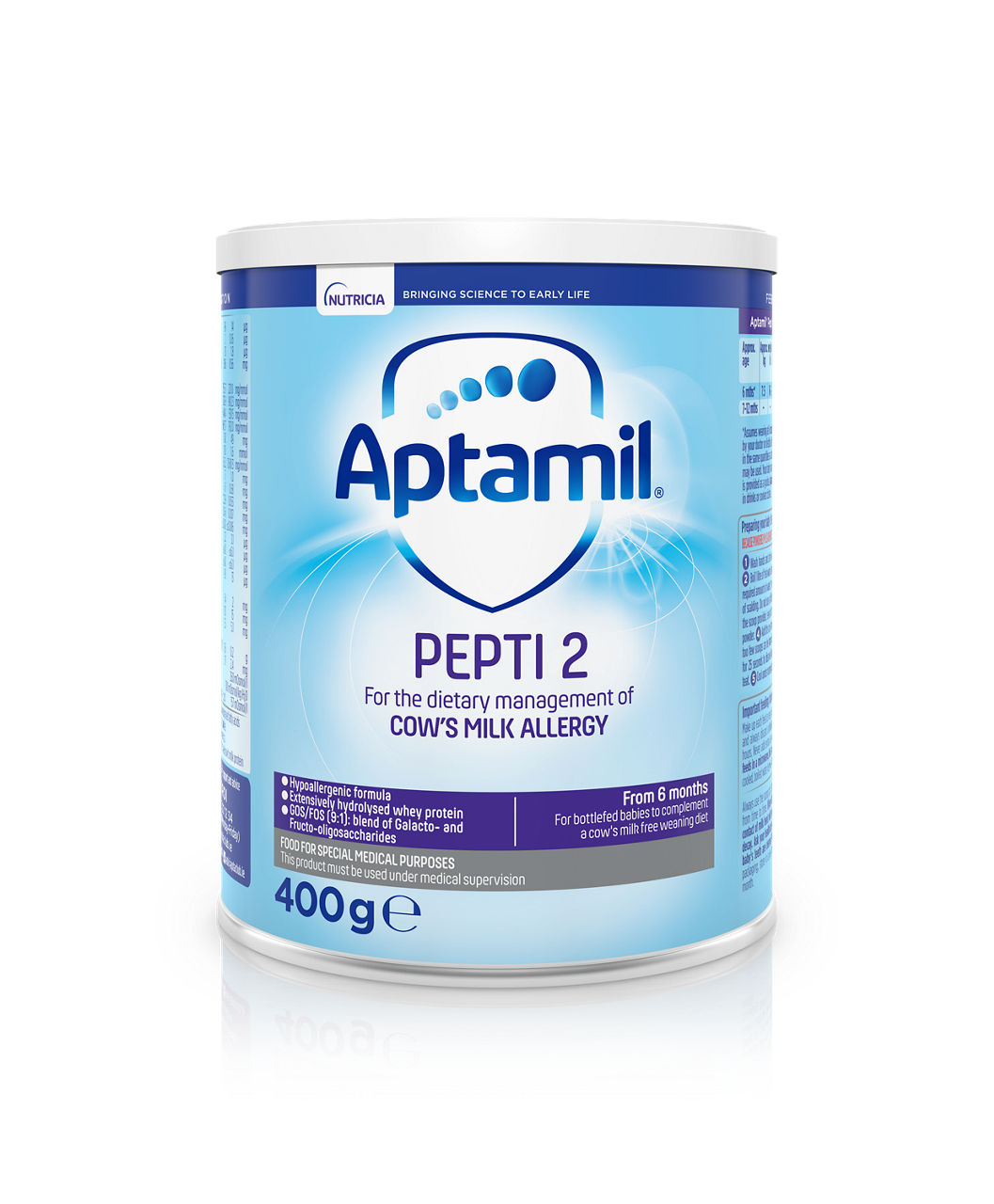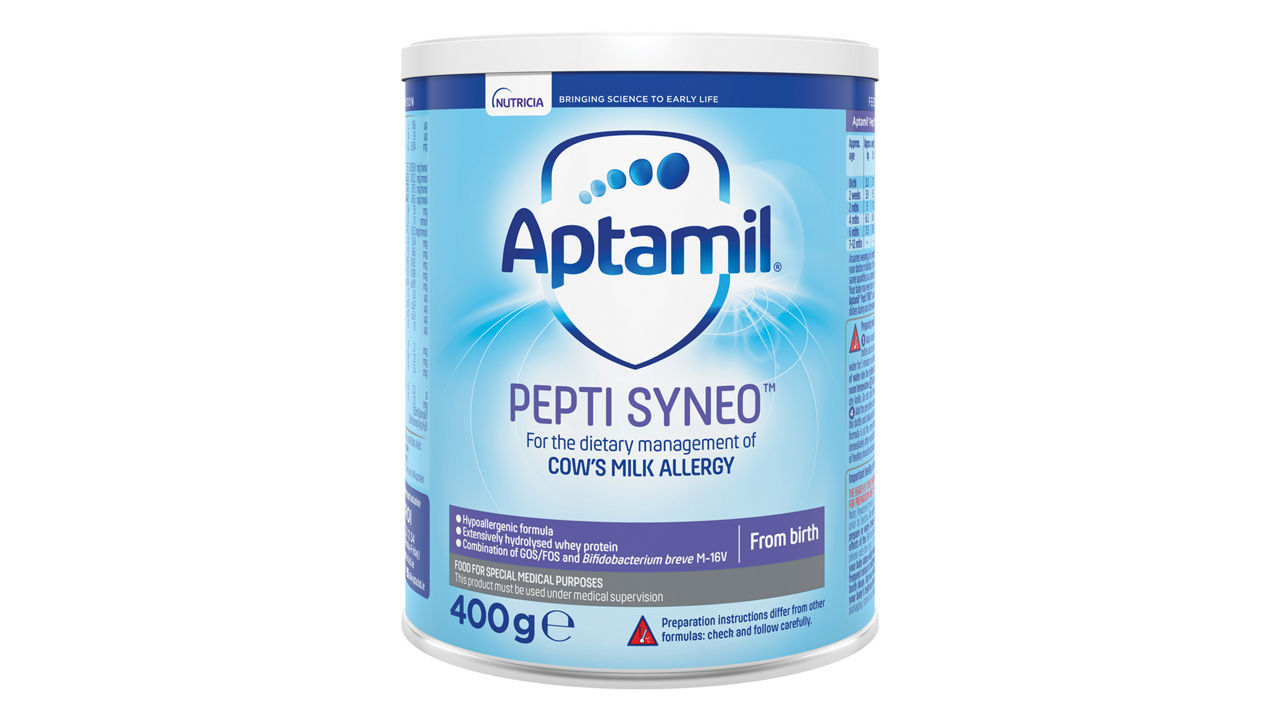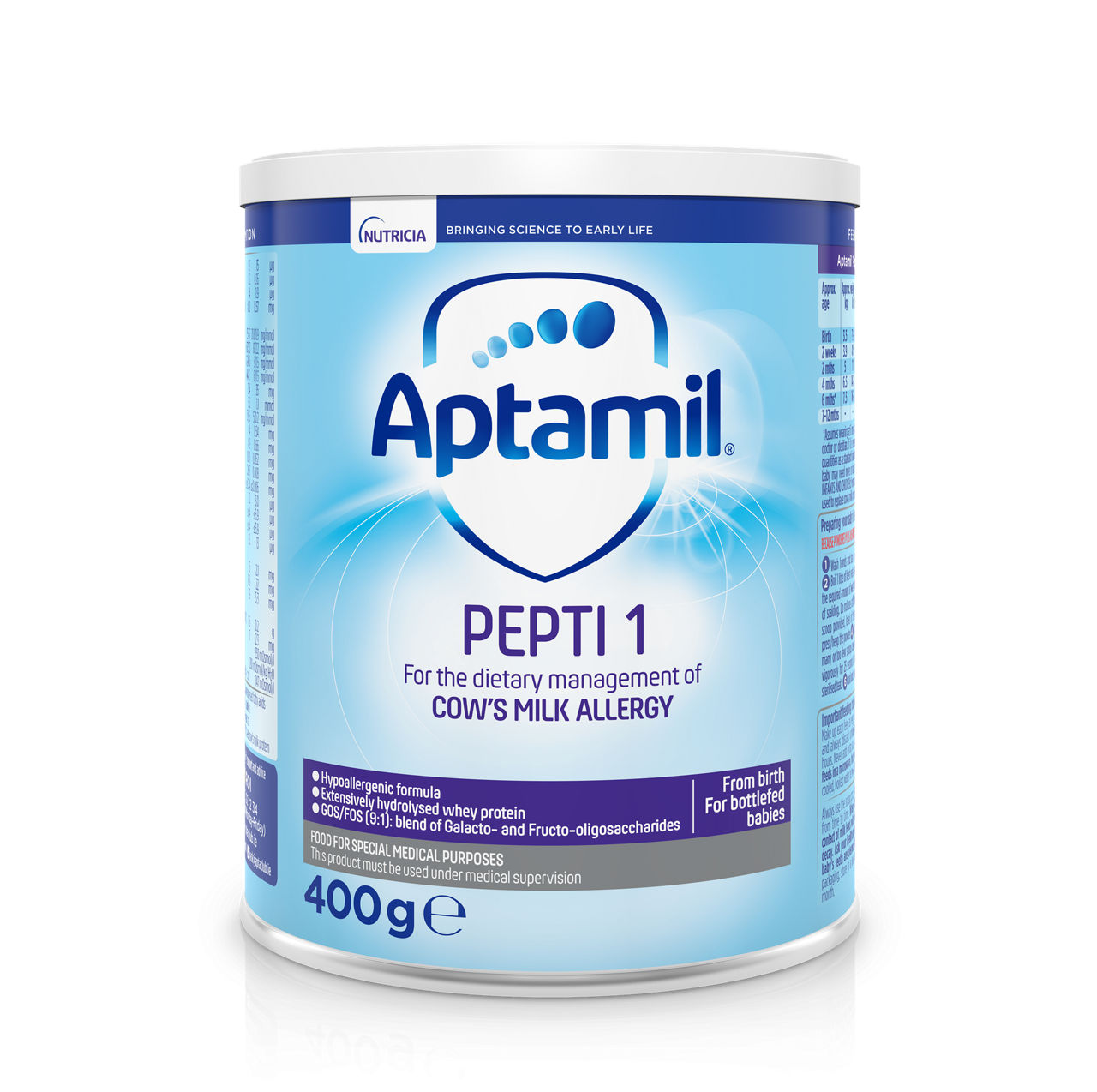Aptamil Pepti 2
Aptamil Pepti 2 is a whey-based extensively hydrolysed formula (EHF) for the dietary management of Cow's Milk Allergy. It is suitable from 6 months of age to complement a cow’s milk free weaning diet and can also be used to replace cow’s milk in drinks and cooked dishes, and after weaning.
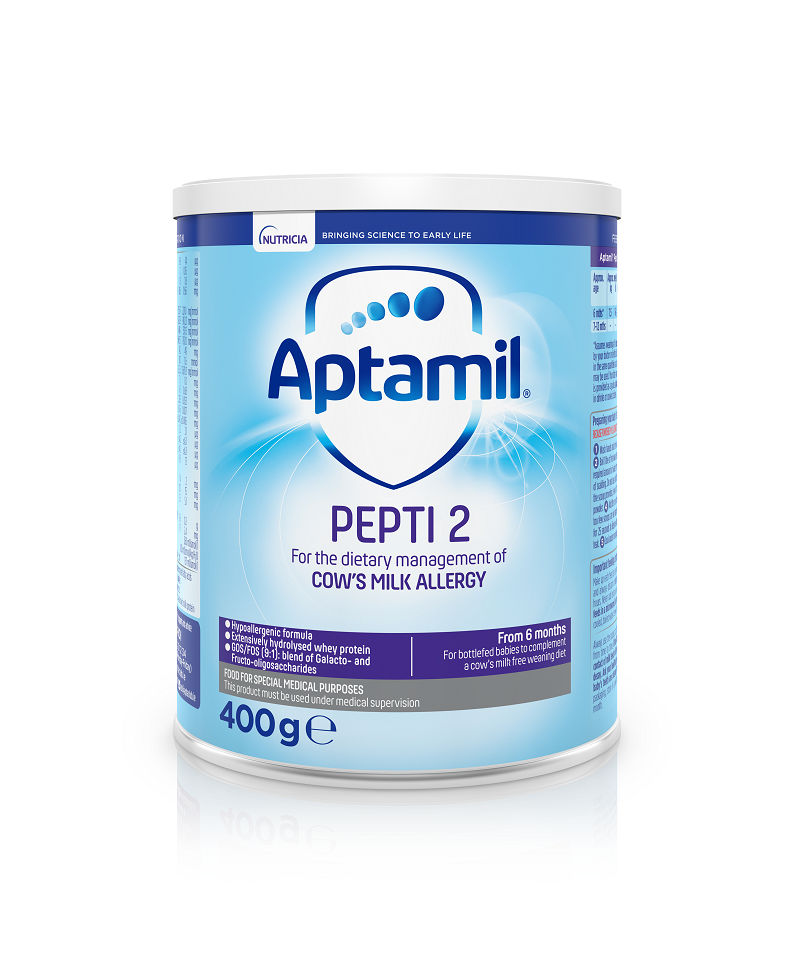
Galacto-oligosaccharides and Fructo-oligosaccharides (GOS/FOS)
Aptamil Pepti 2 includes the prebiotic blend of galacto-oligosaccharides and fructo-oligosaccharides (GOS/FOS). Prebiotic GOS/FOS are clinically proven to reduce the risk of developing allergic manifestations and severity of symptoms for up to 5 years1,2. Learn more about the benefits of prebiotic GOS/FOS here: Aptamil Pepti 1
Superior palatability
Aptamil Pepti 2 is part of the UK’s most palatable EHF range, with UK healthcare professionals recognising the importance of palatability for compliance and the decreased need for formula switches3,4.
The role of lactose
Lactose is the primary carbohydrate in breast milk and plays an important role in the development of infants in the first 1000 days5. Alongside galacto-oligosaccharides and fructo-oligosaccharides, lactose provides benefits for an infant’s gut microbiota6. It also supports the absorption and retention of calcium, key for bone mineralisation5, and improves the palatability of formulas7.
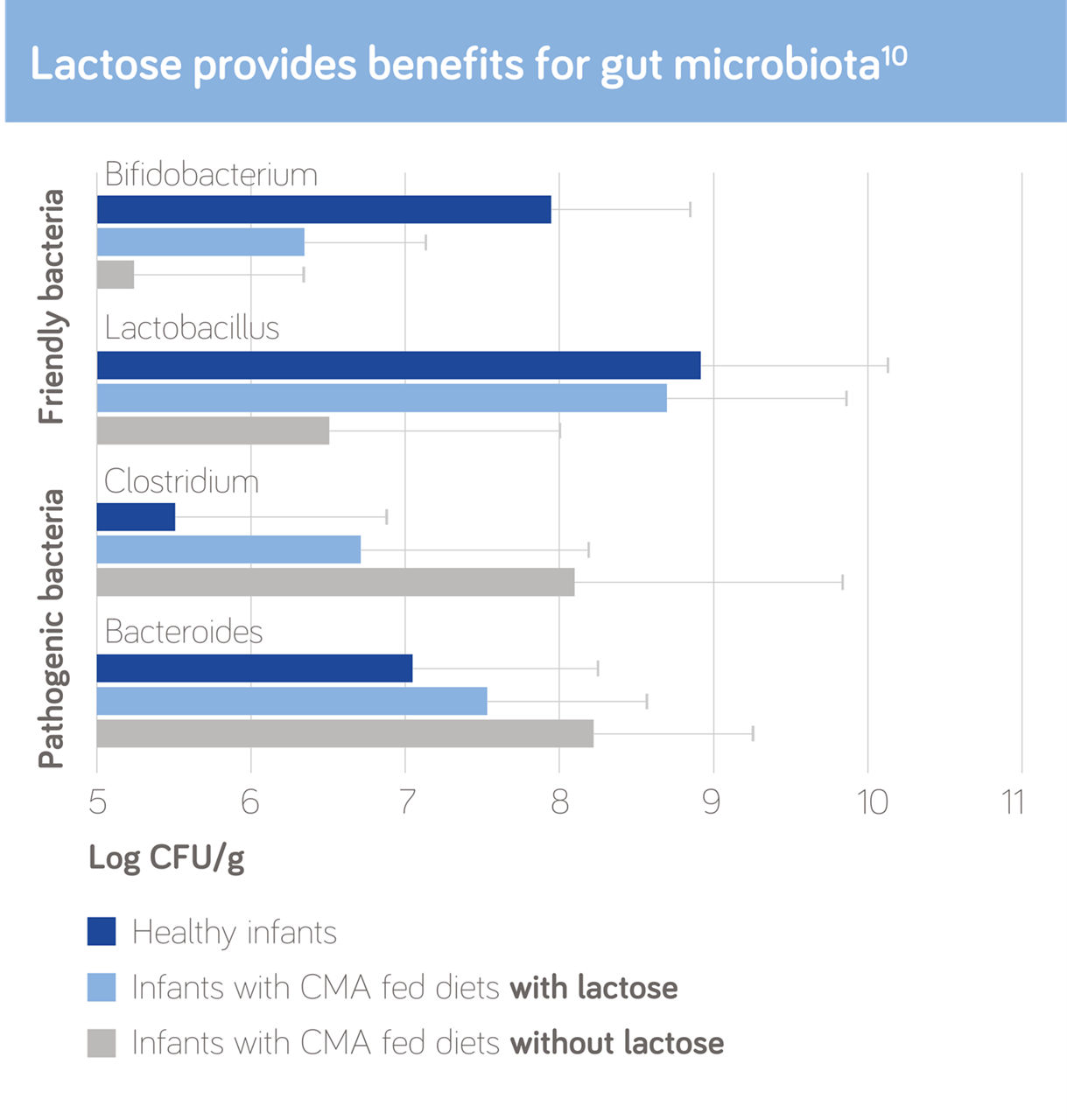
More on Aptamil Pepti 2
What is an extensively hydrolysed formula (EHF)?
The proteins in extensively hydrolysed formulas have been hydrolysed (broken down) into much smaller pieces.
Aptamil Pepti 2 has been designed for the dietary management of cow's milk allergy, so the milk proteins present have been broken down into smaller pieces (hydrolysed) to reduce the likelihood of them causing an allergic reaction.8
How long should an infant stay on Aptamil Pepti 2?
Aptamil Pepti 2 is suitable from 6 months of age to complement a cow’s milk free weaning diet and can also be used to replace cow’s milk in drinks and cooked dishes, and after weaning.
Most alternative plant-based milks are not nutritionally adapted for infants and toddlers; therefore, hypoallergenic formulas are recommended up to at least 12 months of age.9
Is Aptamil Pepti 2 suitable for infants with other dietary requirements?
This product is not suitable for vegetarians as it contains LCPs sourced from fish.
How does Aptamil Pepti 2 differ from Aptamil Pepti 1?
Clinically, the products are the same as they contain the same hydrolysate, and all the evidence to support the clinical efficacy of Aptamil 1 is applicable to Aptamil Pepti 2.
Nutritionally, however, Aptamil Pepti 2 has been specially formulated to provide increased levels of key micronutrients, such as calcium and iron, required from 6 months. Increased levels of calcium are particularly relevant to infants who are on a milk-free diet, as the majority of an infant’s calcium intake usually comes from dairy10. In addition, iron stores start to deplete between 4 and 6 months in infants, so a dietary source of iron is important11.
† Product can be provided to patients upon the request of a Healthcare Professional. They are intended for the purpose of professional evaluation only.
- Arslanoglu S et al. Early neutral prebiotic oligosaccharide supplementation reduces the incidence of some allergic manifestations in the first 5 years of life. J Biol Regul Homeost Agents. 2012;26(3):49-59.
- Arslanoglu S et al. Early dietary intervention with a mixture of prebiotic oligosaccharides reduces the incidence of allergic manifestations and infections during the first two years of life. J Nutr 2008;138:1091-5.
- Maslin K et al. Palatability of hypoallergenic formulas for cow’s milk allergy and healthcare professional recommendation. Pediatr. Allergy Immunol. 2018; 29(8): 857-862. *A home usage test assessment was carried out between 16/11/16 and 9/12/16 on the 4 products indicated for cows’ milk allergy from birth and included 100 UK healthcare professionals.
- Data on file, updated independent taste panel report, Campden BRI, October 2020. n=102 HCPs, Campden BRI blind home usage taste testing, n=102 Dietitians and General Practitioners, n=82 parents. Aptamil Pepti 1 & Pepti Syneo vs all UK EHFs suitable for infants from birth.
- Heyman MB. Lactose intolerance in infants, children and adolescents. Pediatrics 2006;118:1279-86.
- Francavilla R et al. Effect of lactose on gut microbiota and metabolome of infants with cow's milk allergy. Pediatr Allergy Immunol 2012;23(5):420-7.
- Koletzko S et al. Diagnostic approach and management of cow's milk protein allergy in infants and children: ESPGHAN GI Committee practical guidelines. J Pediatr Gastroenterol Nutr 2012;55:221-9.
- Høst A et al. Dietary products used in infants for treatment and prevention of food allergy. Arch Dis Child 1999;81(1):80-4.
- Luyt D et al. BSACI guidelines for the diagnosis and management of cow's milk allergy. Clin Exp Allergy 2014;44:642-72.
- Christie L et al. Food allergies in children affect nutrient intake and growth. J Am Diet Assoc 2002;102(11):1648-51.
- Domellöf M. Iron requirements in infancy. Ann Nutr Metab 2011;59(1):59-63.
Accurate at time of publication: October 2023
Help us provide information most relevant to you
Please ensure your role and areas of interest are up to date.
